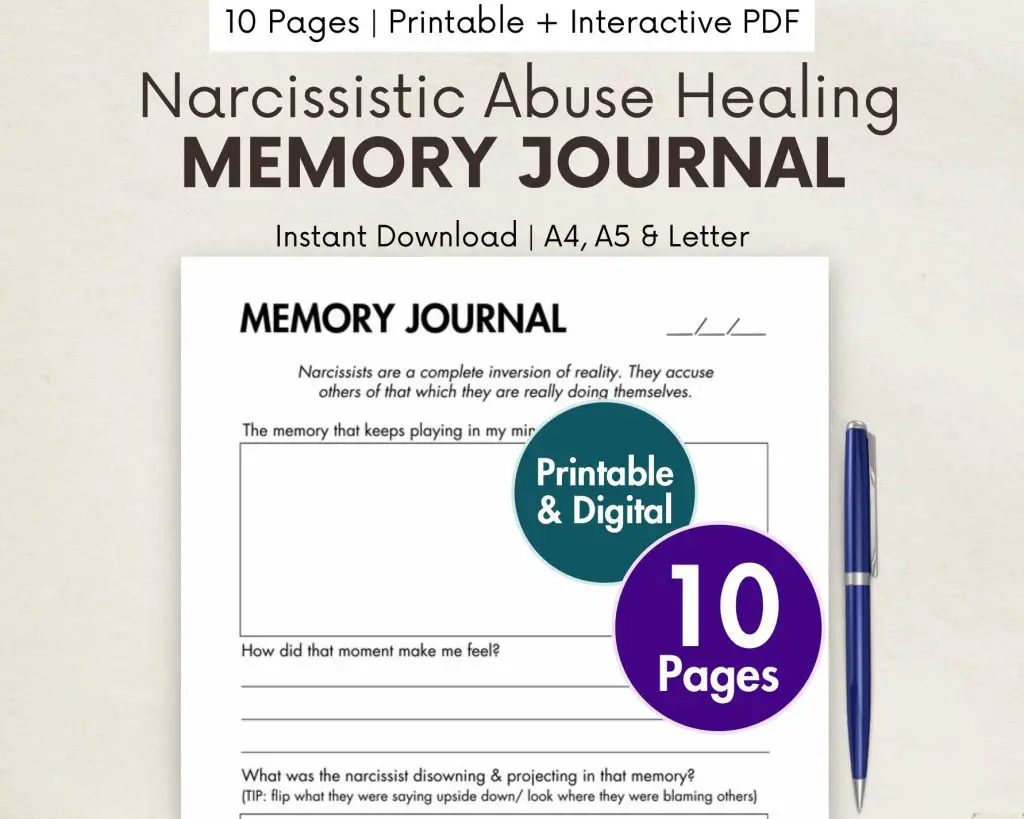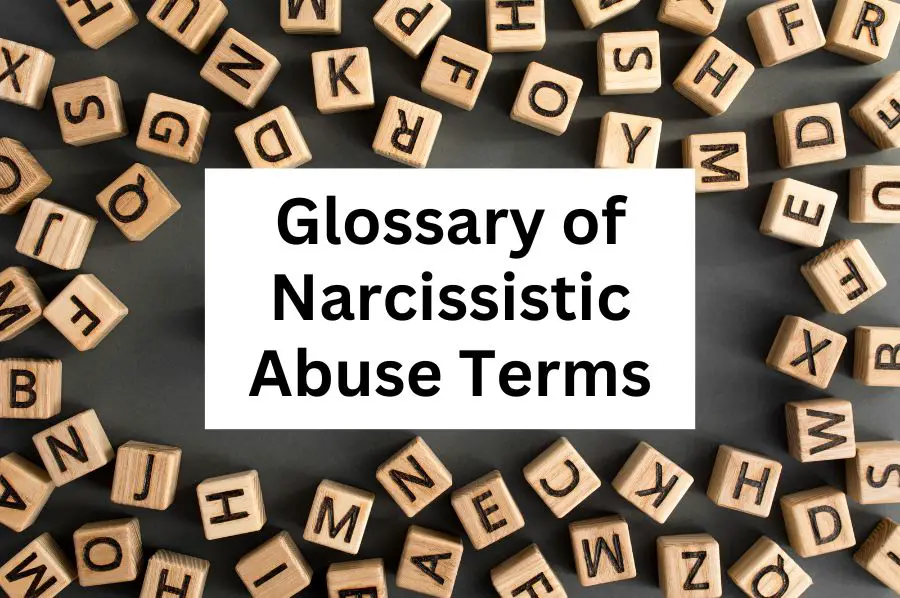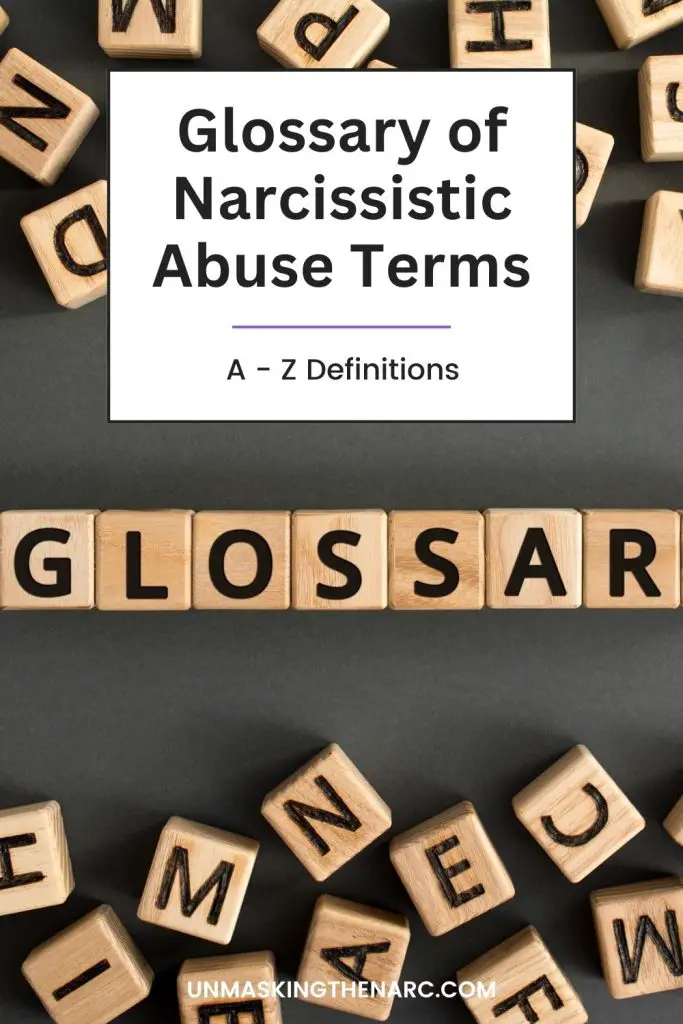Here you’ll find a full glossary of narcissistic abuse terms in one place. Easily understand what all of the words and phrases mean, with examples.
Use the Table of Contents to skip directly to each letter and make use of the articles provided for a deeper understanding of each narcissistic term.
This post contains affiliate links, for more information, see our disclosures here.
Glossary of Narcissistic Abuse Terms
▶️ VIDEO: 30 Narcissistic Terms to Understand
A
Abuse by Proxy
Where the narcissist uses another person (often someone the victim knows) to abuse the victim on their behalf. This works to further isolate the victim, making them feel like everyone is against them and there’s no one they can trust. It also keeps the narcissist’s image intact by not doing the deed themselves.
ACoNs
Acronym for ‘Adult Children of Narcissists,’ commonly used in the narcissistic abuse community.
Altruistic (Communal) Narcissist
This type of narcissist still shares all of the traits of inflated self-importance and entitlement, however, they are less likely to appear narcissistic. They gain their supply from doing good deeds for others and the community, which makes them seem so ‘nice’ and ‘generous.’
The catch is that they’re not doing any of those things out of the goodness of their heart, they’re doing them in order to gain praise and moral superiority. That is how they gain supply to feed their inner black hole.
B
Baiting
Where the narcissist intentionally accuses you of something or triggers one of your deep wounds in order to get a reaction. They generally want to pull you into an argument for their own amusement or agenda.
Baiting can be verbal and/ or physical.
Two (2) reasons why narcissists will bait:
- Your huge emotions hand over Grade A narcissistic supply (life force energy) to them
- You hand them ‘proof,’ which they can use to further their storyline that you’re the crazy and unstable one
Blame-shifting
Blame-shifting is a tactic used to divert the spotlight off themselves and to completely rig up a negative narrative around somebody else.
You’ll be so busy trying to defend yourself against their accusations, whether true or imaginary, that the original topic of concern will be completely forgotten about. Accusing you is a total avoidance of accountability, which the narcissist uses to ‘explain’ why the things they’ve said and done are all your fault, not theirs.
Boundaries
Personal boundaries are the limits and rules we set for ourselves within relationships including being able to say “No” when we want to. Boundaries allow us to feel safe and are a basic human right.
Due to the narcissist’s extreme entitlement and viewing of people as objects for them to use for personal gain, they do not respect boundaries. In fact, narcissists actively work to erode people’s boundaries because they don’t think they apply to them.
For children who grow up in narcissistic households, boundaries are more or less forbidden by the narc parent.
Breadcrumbing
Where the narcissist gives small amounts of affection and attention to their victim to keep them hooked and hanging out for more.
C
Cluster B Personality Disorders
Cluster B personality disorders are all marked by inappropriate and volatile emotionality, with unpredictable behaviour. It’s common for an individual with one of the disorders to display traits across many of the disorders.
The four (4) Cluster B Personality Disorders:
- Narcissistic Personality Disorder
- Antisocial Personality Disorder
- Borderline Personality Disorder
- Histrionic Personality Disorder
Codependency
Codependency is essentially where someone seeks safety, security, survival and love outside of themselves, rather than learning to meet those needs themselves.
People who have grown up or lived in abusive or unstable environments tend to become codependent as a result of the abuse. They are programmed that their needs don’t matter and the needs of the other person must always come first. Due to the heavy control and manipulation, they learn that for their own survival, they must make sure the other person’s needs are always met, even to their own demise.
Coercive Control
Coercive control is where an abuser uses non-physical tactics to control their victim through fear. They will gaslight, manipulate, stonewall, isolate, intimidate and threaten as a means to program their victim.
The idea is to instil fear in the victim to get them to do what they want, rather than raising a hand. Coercive control is a very sly and insidious abusive technique, which is often used by narcissists.
Cognitive Dissonance
Where the mind has two opposing thoughts or beliefs at the same time. It’s essentially a psychological state that keeps you clinging to who you think the narcissist is, rather than who they truly are. One day they’re loving, the next they’re cruel and rageful.
This abuse pattern keeps you in a state of confusion and self-doubt, losing the ability to trust your own judgment.
On one hand, you can recognise on some level that you’re being abused or mistreated, yet you justify (lie) to reason with yourself as to why the behaviour is happening.
Example: “They’ve just had a bad day.”
Complex PTSD
Complex Post-traumatic Stress Disorder (C-PTSD) is a condition that occurs after prolonged and repeated trauma, such as abuse or domestic violence.
C-PTSD Symptoms:
- Hypersensitivity
- Flashbacks
- Nightmares
- Self-blame
- Low self-worth & shame
- Erratic emotions
- Numbing out
- Trust issues
- Anxiety & depression
C-PTSD is common during and after experiencing narcissistic abuse.
Covert (Vulnerable) Narcissism
Covert narcissists have the same beliefs of entitlement, superiority and self-importance as grandiose narcissists, but they lack the charm and extroversion needed to be in the spotlight. So, they will gain the attention they crave through more passive-aggressive means, such as playing the victim, guilt-tripping and gaslighting.
Covert narcissists appear ‘shy’ and introverted, however, they are sullen creatures who are resentful towards a world that never gave them all of the riches and acclaim they feel they deserve. They feel shame on the regular and are hypersensitive to any criticism from the outside world that reinforces that shame.
D
Devaluation
This is where the narcissist belittles you, calls you names and completely invalidates your feelings and experiences. They want to reiterate that you are worthless, your experiences mean nothing and your feelings are a mere inconvenience.
When the narcissist punishes you, rejects you or rages at you, completely out of the blue, it leaves you feeling extremely anxious and unstable. Devaluing works to erode your self-worth, meaning that you’ll feel so worthless, you won’t even bother trying to leave the narcissist.
Denial
An abuse tactic narcissists use to avoid accountability and/ or shift the blame onto someone else. They will also use denial to invalidate your experiences in order to gaslight.
Narcissists are massive deniers of truth given that their whole false reality is built on lies and illusions.
Discard
Narcissists have little to no empathy or compassion and they do not view other human beings in a healthy way. To them, people are merely objects to be used up and tossed aside when they’re done – this is called a ‘discard.’
Once you are no longer serving the narcissist in the way you’re expected to, they’ll discard you in place of someone else who’s fully topped up and not yet depleted (energetically). It’s no different to swapping out flat batteries for new ones.
E
Ego
The ego is the part of all humans that is responsible for me, myself and I. It views life as a dog-eat-dog world and will use whatever means necessary to survive. The ego is also responsible for the lower vibrational aspects of being human, such as manipulation, power, greed and competition.
Narcissists are ruled by their ego, which is why they have an unhealthy dose of all of those negative qualities and don’t see a problem with that.
Emotional Abuse
Emotional abuse is an invisible tactic whereby an abuser controls and manipulates another person’s emotional state. They aim to erode that person’s self-worth and independence for their own gain.
Common tactics include gaslighting, belittling, devaluing, shaming, raging and push-pull behaviour.
Enabler
An enabler is someone who allows the narcissist’s behaviour. They perpetuate the abusive behaviour out of fear of the narcissist’s reactions (survival) or because it’s been so normalised in their world, that they can’t see that there’s anything wrong with it.
Another reason people can enable the narc’s behaviour is if there is some type of reward in it for them. In other words, the narcissist is exploiting them for personal gain.
Entitlement
When someone feels they have a right to something even if they’ve done nothing to deserve it.
Narcissists feel extremely entitled to whatever they want due to their over-inflated sense of superiority. In their fantasy world, they are the most important person and the whole world revolves around them, therefore they should be able to say and do as they please without consequences.
F
False Self
The False Self is the fake persona the narcissist’s ego has created as a front to get the narcissistic supply (life force energy) that they need to stop from falling into the empty black hole inside.
This False Self is nothing but a delusion in the narcissist’s mind, however, they can’t face the truth whereby they are not perfect, superior or special.
So, for the narcissist to psychologically survive, they need to keep receiving validation from the outside world to reinforce that their False Self really is real. This is why they require constant attention and admiration because that is what props up the illusion of the False Self and their entire fantasy reality.
Fauxpology
The narcissistic apology is the most common and insulting non-apology you’ll ever come across.
The narcissist’s fauxpology will either be completely fake, designed to feign remorse and hook you back into their abuse cycle or it will be an excuse to avoid accountability and put the onus back onto you.
Examples of a fauxpology:
- “I’m sorry if you misunderstood my actions.”
- “I apologise, but you have to admit, you overreacted.”
- “I’m sorry, but it wasn’t entirely my fault.”
- “I’m sorry, but you know I didn’t mean it.”
- “I’m sorry, but I only did it because you pushed me.”
- “I apologise, but you have to see things from my perspective.”
- “I’m sorry, but I can’t be held responsible for your feelings.”
The only true apology is changed behaviour.
Fawning
The fawn response in abuse victims is where they abandon their own needs in order to tend to the abuser and avoid conflict or punishment.
Narcissists actually use fawning (flattery and pandering) as a manipulation tactic to butter up their victims for more abuse. This causes mental confusion (cognitive dissonance) as the victim sees two opposing sides of the narcissist – nice and cruel. They will end up choosing to believe that the narcissist is essentially ‘nice,’ sprinkled with some mean moments because that is who they want the narcissist to be. However, the truth is the exact opposite.
Flying Monkeys
The term comes from The Wizard of Oz where the wicked witch sends her ‘flying monkeys’ out to do her bidding for her.
Flying monkeys describe the people in the narcissist’s life who they enlist to do their dirty work for them. The object of the game is to use others to rewrite history, so that the narcissist can paint themselves in the light they want to be seen in (despite the truth) and to destroy you and everything you hold dear.
What flying monkeys engage in is known as abuse by proxy. Oftentimes, however, they don’t realise this because they’re also being manipulated by the narcissist.
Future Faking
This is where a narcissist will promise you all sorts of things to either get you to stay or to hand over whatever it is that they want at that moment.
The narcissist has no intention of following through with their promises, it’s all about telling you what you want to hear in order to push through your boundaries.
Narcissists’ future fake to make themselves look good without actually having to lift a finger and do anything. Future faking shows that they do really know what you want, but they have no desire to give it to you. They’ll keep you in a place of hope and happily string you along, but the real control is in them not giving it to you.

Memory Journal
Release the painful memories once and for all!
- Journal recurring thoughts
- Sort through what’s yours vs. theirs
- Identify your inner wounds to heal
- Return the narcissist’s disowned wounding
- Step-by-step guidance
- PRINTABLE & DIGITAL
G
Gaslighting
Gaslighting is an extremely manipulative and abusive technique all narcissists use. The purpose of gaslighting is to gain control over the victim by slowly and subtly eroding their own sense of reality, causing them to doubt themselves and their own sense of worth.
Common gaslighting techniques:
- Countering your memory of things that have happened
- Denying entire conversations and events
- Withholding conversation, love and affection
- Invalidating and belittling your feelings and concerns
- Diverting the focus off themselves and back onto you or someone else
- Generalising with stereotypes and blanket statements to invalidate
Golden Child
The golden child is the one whom a narcissistic parent pegs as their ‘favourite.’ They will generally get special privileges, be treated better and have fewer chores than their siblings.
The golden child is often viewed with unrealistic ‘greatness’ in the narcissistic parent’s eyes and can come with some heavy expectations because of that. The narc parent sees the golden child as an extension of their own superior traits.
In families with narc parents, it’s always clear to the children who the favourite is and who the scapegoat is.
Grandiose (Overt) Narcissism
A grandiose narcissist is overly confident, charismatic and entitled. They do not feel the shame that the covert narcissists do and have the ability to make themselves centre-stage most of the time. They will use this to propel themselves in their career, gain attention and admiration and exploit people to get whatever they want.
Grandiose narcissists have an unrealistic sense of superiority, which oozes out of their pores and they will become aggressive if anyone questions that.
Grey Rock
To go ‘grey rock’ is where you take on the energy of the most boring, forgettable grey rock you can imagine. You don’t enable the narcissist or react to them in any way and basically be so boring that the narcissist will lose interest and move on to another target.
H
Hoover
Hoovering is a common tactic that narcissists will use when you have escaped (or are escaping) their toxic web and they want to pull you back into their world. Much like a Hoover will vacuum up everything in its path, a narcissist will try to do the same.
Examples of hoover tactics:
- Reaching out
- Appearing remorseful
- Making false promises
- Restart the ‘love bombing’ with gift, money, complements etc.
- Playing the victim
- Accusing you on things
- Urgently needing your help
The aim of hoovering is to coerce a person, through seemingly innocent and kind gestures, back into a position where the narcissist can use them for their own personal gain.
Hypervigilance
This is where a victim of narcissistic abuse is on high alert much of the time as they try to anticipate the next attack to try and avoid it. Prolonged hypervigilance often leads to C-PTSD, adrenal fatigue and other emotional and physical issues.


I
Intermittent Reinforcement
A pattern of cruel and cold-hearted treatment, mixed with random acts of kindness.
The abuser delivers the rewards (affection, gifts, generosity, flattery) at irregular intervals. This randomness keeps the victim in a state of always wanting to please in the hopes of receiving the affection and validation that they are craving.
This is how the victim becomes addicted to their abuser, who has now become their source of relief from the constant state of anxiety that they are kept in (albeit at the hands of that very same abuser).
L
Lost Child
The lost child will try to bring as little attention to themselves as they can in a narcissistic household. They will keep quiet and reduce their needs as much as possible to avoid being attacked.
Love Bombing (Idealisation)
Idealisation (also known as Love Bombing) occurs at the very beginning of the relationship or friendship with the narcissist.
This is essentially a full-blown honeymoon phase where the narcissist really does think they’ve found the perfect one (supply) and will put you up on a pedestal. Because the narcissist wants to hook you in as their (energetic) supply, they’ll work to secure you as quickly as possible.
The idealisation phase with a narcissist can be very intoxicating. They can be incredibly generous and attentive. You’ll feel as though this person truly sees you, which will have you opening up and sharing many of your dreams, desires, fears and hopes with the narcissist.
M
Malignant Narcissist
Malignant narcissism is a psychological syndrome comprising an extreme mix of narcissism, antisocial behaviour, aggression and sadism. Malignant narcissists are more likely to be physically abusive and actually get off on causing others pain.
Manipulation
Manipulation is where someone intentionally and skillfully gets another person to do what they want them to do.
For the narcissists’ false reality to constantly remain inflated and real to them, they are constantly manipulating their outside world (i.e. people) to reflect their ‘truth’ back to them.
There is nothing real about a narcissist because they cut off their authentic self a long time ago. Their whole existence is built on lies and manipulations, with no authenticity whatsoever.
Mirroring
Mirroring is where the narcissist observes what other people are saying and doing and copies them as a way of fitting in and being ‘normal.’ Since they are a False Self, they need to collect data from the outside world on how they’re ‘supposed’ to act in certain situations so that their inauthenticity goes unnoticed.
Narcissists will also mirror people to gain their favour, love-bomb them and hook them in. Mirroring establishes a sense of trust in their new potential supply because they’ll feel so similar, meaning that they’ll more easily allow themselves to become vulnerable to the narcissist.
N
Narcissistic FOG
Acronym for ‘Fear, Obligation and Guilt.’ Narcissists use these tactics to keep their victims in a fog and unable to see what’s really going on behind their manipulations.
Narcissistic Injury
A narcissistic injury is where a deep emotional wound is triggered within the narcissist, causing extreme devastation to their pride and False Self. Their Ego feels directly attacked, which puts their whole facade at risk of being exposed.
As the narcissist refuses to acknowledge their own wounds, they will respond to the attack on their Ego (whether real or perceived) by seeking to punish the person who triggered it in the first place.
Narcissistic Personality Disorder (NPD)
Narcissistic Personality Disorder is a mental health condition in which people have an unreasonably high sense of their own importance. They need and seek too much attention and want people to admire them. Their need for admiration is so extreme that they will use and abuse those around them in order to gain it.
NPD symptoms include:
- Excessive need for admiration
- Disregard for others’ feelings
- Inability to handle criticism
- Sense of entitlement
- Superiority complex
Narcissistic Rage
Narcissistic rages are often caused by a deep inner trauma being triggered within the narcissist. However, the narcissist does not want to feel those things, so they push all of their emotions outward in a big ball of anger. And now it’s all your fault!
Narcissistic rages can be terrifying to witness and can sometimes turn violent. Narcissists use rage to control those around them through fear, while completely disowning the parts of themselves they don’t like and dumping them onto you.
Narcissistic Supply
Narcissistic supply is the life force energy narcissists require to abate their empty black hole, which is filled with utter shame, self-loathing and disgust. Narcissists need ‘supply’ for their psychological survival.
Supply is essentially anything that positively reinforces the narcissist’s fantasy version of themselves, which is required to keep their ego’s False Self alive.
Two (2) types of narcissistic supply:
- PRIMARY Supply – Gained via attention (positive or negative)
- SECONDARY Supply – Gained via appearances (must be positive)
Narcissist’s Mask
The narcissist’s mask is the facade of their False Self. It’s the image they portray for how they want to be seen, rather than who they truly are. The narcissist’s mask is what they use to manipulate people into handing over narcissistic supply.
No Contact
No contact is where a victim of narcissistic abuse chooses to sever all ties with the narcissist due to having their boundaries systematically broken over and over again. This is where all attempts of contact by the narcissist are denied and the victim completely blocks the narcissist at their end.
Oftentimes, going no contact with a narcissist is the only way to free yourself from their abusive cycle and be able to heal healthily. This is the recommended approach when dealing with any narc who doesn’t need to be in your life (ex-partners, toxic friends etc.).
P
Pathological Liar
A pathological liar is someone who consciously lies to get their own way. Narcissists are pathological liars. This is in contrast to a compulsive liar who lies out of habit and struggles to break the cycle.
Traits of a pathological liar:
- Goal-oriented
- No regard for the feelings of others
- Manipulative & cunning
- Often believe their own lies over time
- Hard to catch them out because lying is constant
- Confident liars (will hold eye contact)
- Have a weak grasp of reality
Projection
Where the narcissist flips back onto you all of the things that they are doing, but refuses to take responsibility for. Their ego simply cannot accept any information that goes against their fantasy reality, whereby they are perfect and superior.
So, immediately, it will superimpose the very things that they are doing (or being accused of) back onto you because they don’t want to deal with those wounds. Now, their ego actually does see you as doing those very things and it needs to line you up and annihilate you in order to extinguish those flaws from its fantasy version of reality.
R
Reactive Abuse
Reactive abuse is where the person being abused finally reaches breaking point and lashes out or fights back against the abuser. The abuser will intentionally push them to this point, then remain calm and point the finger at the victim, calling them the ‘crazy one.’
Red Flags
Red flags are warning signs throughout the relationship that suggest things aren’t quite right. People with low boundary function and codependency often ignore or miss red flags due to the overwhelming desire for the narcissist (or other person) to be who they really want them to be.
S
Scapegoat
In narcissistic families, the scapegoat is the opposite of the golden child. The scapegoat is dished out unfair treatment, harsher punishments and is the dumping ground for the narcissistic parent’s disowned shame and self-loathing.
Interestingly, I’ve found that scapegoats tend to be the more empathetic child who has some level of being able to see through the narcissist’s mask… and the narc despises them for that.
Smear Campaign
Narcissists will embark on smear campaigns when they want to control the public storyline to suit their agenda. They will drag your good name through the mud with the intent of totally ruining you.
Everything with a narcissist is about winning. So, if they can’t control you or what you’re saying about them, they’ll do everything they can to completely annihilate you. They must do this to keep their false image intact. You see, you know too much about them now and they cannot risk you telling anyone about who they truly are behind their mask.
The narcissist needs to paint themselves as either the hero or the victim at your hands, making you the bad guy in the story.
They will spread their smear campaign far and wide with the use of Flying Monkeys so that anything you say or do will either reinforce their lies or no one will believe you.
Somatic Narcissist
A somatic narcissist is obsessed with their body and looks while being overly critical of how others appear. They will use their appearance and sex to gain narcissistic supply.
Stonewalling
The refusal to communicate with someone. A common tactic used by a narcissist to actively block the connection by being evasive, refusing to answer any questions and not cooperating with any attempts at contact.
The famous narcissistic silent treatment is a great example of stonewalling. They use it to intentionally put their victim into a state of anxiety and hold out with the ‘reward’ (granting of communication) to control them.
T
Trauma Bond
An emotional bond that is formed between an abuser and their victim. It happens through the recurring cycle of abuse, devaluation and positive reinforcement (i.e. intermittent punishments and rewards).
The victim feels bonded to the person who’s destroying them because they feel the abuser is the only person who can provide them with the relief they so desperately seek to abate their intense anxiety. What the victim fails to recognise is that the abuser is the very person who keeps causing the anxiety in the first place.
Triangulation
The manipulative art of triangulation is all about bringing in third parties to back up the narcissist’s agenda and to further your own anxieties. They may compare you to others or bring in the opinions of others (whether true or false) to destabilise you.
Triangulation aims to control you, make you feel unworthy, put you on the defensive or make you want to work even harder at pleasing the narcissist.
Examples of triangulation:
- “See, even my boss/ Mum/ mutual friend [insert any name] thinks you’re crazy!”
- “My ex-partner was a much better cook than you.”
True Self
The True Self is our authentic self that we are all born with. It is our direct connection to the divine creator (whatever that is for you).
Our True Self is responsible for all of the things that make us authentically human, such as love, compassion, empathy and kindness. The connection with our True Self is also what gives us access to inner safety, security and love.
The narcissist amputated access to their True Self when they unconsciously chose to make the ego their master. They have been left with an empty black hole, filled with utter despair and self-loathing ever since. The only way for them to abate that black hole is to steal and pilfer life force energy from other whole beings, but it’s a never-ending quest, much like a drug addict.
W
Word Salad
The purpose of a word salad is to create mass confusion in a conversation and take the other person down such an elaborate rabbit warren of topics, that you can’t even remember where the conversation began.
Narcissists are masters at using word salad as a manipulation tactic, which serves to distract the other person away from any truth or blame towards the narc. They will throw accusations into the conversation to make the other person feel like they need to defend themselves. The narcissist will also play the victim so that you end up apologising or trying to help them, rather than discussing the original issue surrounding their abuse.
Hopefully, the glossary of narcissistic abuse terms helps you to further understand what’s behind the personality disorder and why you need to put yourself first for your mental well-being.
| READ: Narcissist Checklist → |


Energetic Healing from
Narcissistic Abuse
If you’ve tried everything to heal but still can’t shift things, it might be time to call in the spiritual realm.
✭ Removal of stuck energy
✭ Removal of old traumas & memories
✭ Past Life Regression
✭ Understanding your journey & how it’s shaped you
✭ Loving & non-judgemental guidance
✭ Psychic mediumship
✭ Ask your guides questions & get direct answers
10% OFF Code ‘UNMASK‘
www.selenahill.com →





